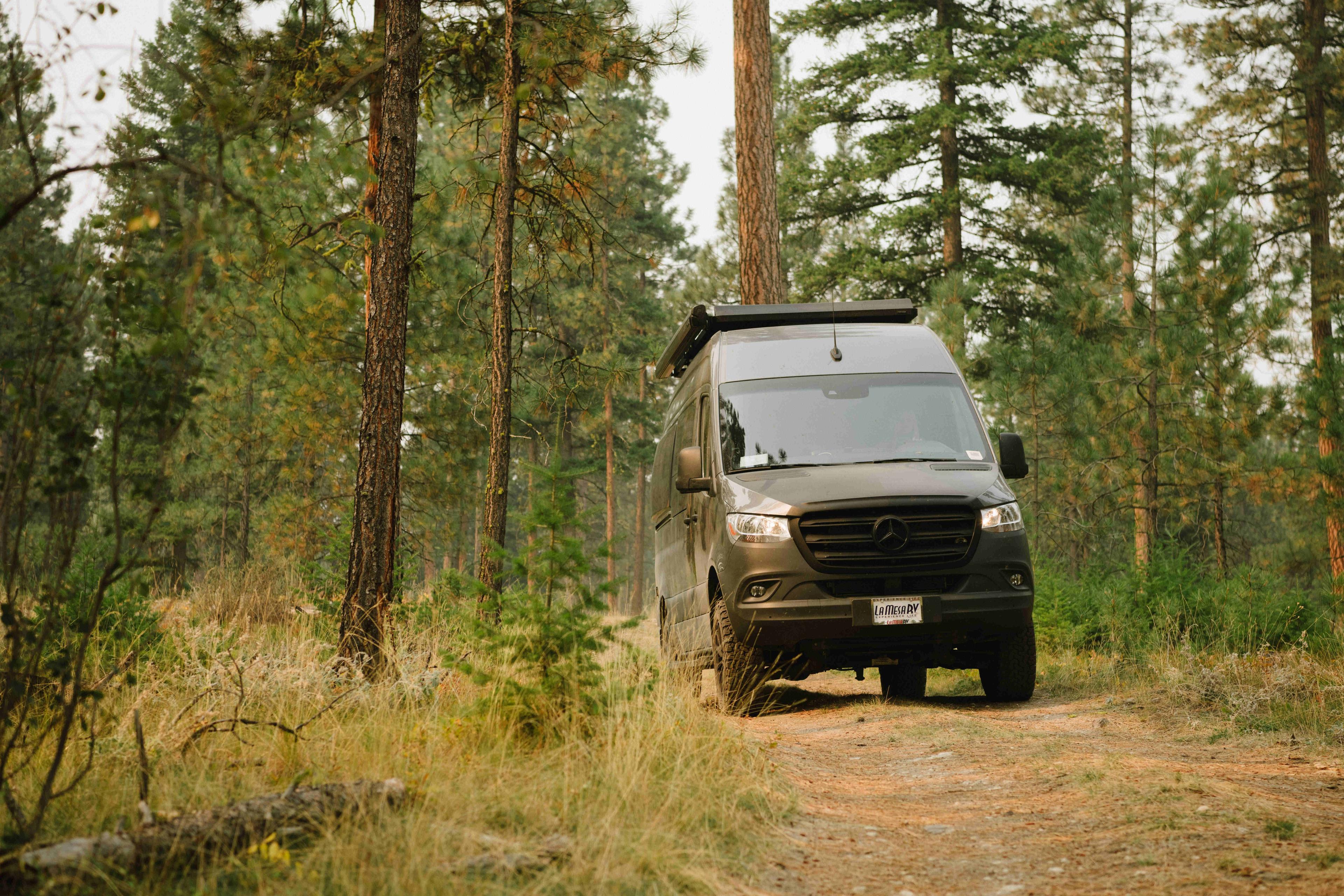Dec 1, 2021
RV bug screens: Keeping bugs out of your RV
RV bug screens: Keeping bugs out of your RV
A
By Aaron Ammar
Discover how to keep bugs out of your RV with bug screens. Learn about the best RV bug screens and tips for a bug-free adventure in your home on wheels.
Common questions
Blog Post
Education

RV Bug Screens: Complete Guide to Keeping Your Rig Pest-Free
RV bug screens are protective mesh barriers that install over your appliance vents—specifically furnace, water heater, and refrigerator vents—to prevent wasps, mud daubers, rodents, and other pests from entering and building nests that interfere with airflow and cause expensive damage.
Nothing ruins a camping trip faster than discovering wasps have built a nest in your furnace vent or mice have chewed through your water heater wiring. The good news? Installing RV bug screens is one of the easiest and most effective ways to protect your rig from costly pest damage.
Whether you're a weekend warrior hitting the campground or a full-timer living the nomad dream, bug screens are essential gear. They're like mosquito nets for your RV's vital organs—simple to install, cheap to buy, and worth their weight in gold when it comes to preventing repair bills.
What Are RV Bug Screens and Why Do You Need Them?
RV bug screens are fine mesh barriers made of stainless steel or durable synthetic materials that cover appliance vents to block insects, birds, and small animals while maintaining proper airflow for safe appliance operation.
Bug screens protect your RV's furnace, water heater, and refrigerator vents from insects and debris that can interfere with airflow and cause serious damage to appliances. Here's what they protect against:
- Wasps and mud daubers are building nests that block airflow
- Mice and rodents that chew through wiring (especially attracted to soy-based wire coatings)
- Birds looking for nesting spots in dark, warm vents
- Debris like leaves and twigs that accumulate over time
Pest damage is most common when RVs are in storage, as creatures seek warm, sheltered spaces and can cause thousands in damage by eating wires and nesting in walls. According to RV industry pest prevention experts, geographic region and weather patterns affect pest activity, with shorter winters and warmer weather meaning longer breeding periods and earlier emergence from overwintering states.
Where Do RV Bug Screens Go? Key Vent Locations
Bug screens install over three critical vent areas: furnace exhaust vents (usually round, located on the exterior), water heater vents (typically rectangular on the rear or side), and refrigerator vents (found on the exterior side of your rig).
Furnace Vents
Most RV furnace vents are round and fit Duo-Therm and Suburban brands, with screens featuring heavy-duty stainless steel mesh. Look for these small circular vents on your RV's exterior—usually on the side or rear.
Water Heater Vents
Water heater screens are typically rectangular and sized specifically for different gallon capacities (6, 10, 12, or 16-gallon units) from brands like Dometic, Suburban, and Atwood. These vents are commonly found on access doors on the exterior.
Refrigerator Vents
Refrigerator vents often have long louver openings (like 20-inch Dometic models) that require specially-sized screens to cover the entire opening.
Pro tip: Measure your vents before shopping. Different RV manufacturers use different vent sizes, and getting the wrong size defeats the purpose.
How to Install RV Bug Screens: Step-by-Step Guide
Most RV bug screens install using spring-loaded clips or fasteners included in the kit—simply hook the spring to the screen, position it over the vent, and use the installation tool to secure the other end to the vent housing.
Here's the basic process that works for most screen types:
For Furnace and Water Heater Screens:
- Secure the spring to the screen center - Hook the spring to the screen securely by hand, making sure it doesn't detach when you let go
- Position over the vent - Place the screen directly over the vent cover
- Thread through with tool - Use the provided tool to thread the other end through the center of the vent cover, going through both the screen and spring
- Check security - Give it a gentle tug to make sure it won't blow off during travel
For Refrigerator Screens:
Use zip ties to secure rectangular refrigerator screens to the vent covers—simple zip ties hold them effectively in place.
Installation time: About 5-10 minutes per screen. No special tools needed beyond what's included in the kit.
How to Maintain RV Bug Screens and Keep Them Working
Check screens before and after each trip for damage or debris buildup, and clean vents regularly to remove dust and debris that can accumulate and reduce airflow effectiveness.
Basic maintenance is straightforward:
- Visual inspection - Look for tears, loose fasteners, or bent edges
- Clear debris - Remove leaves, spider webs, or other buildup
- Check springs - Replace spring fasteners if they become loose or damaged—replacement springs are available from most RV parts suppliers
- Clean when needed - A soft brush or compressed air works great
Seasonal tip: During storage season, screens work overtime protecting against nesting creatures, so inspect them extra carefully before your first trip of the year. Bug screen maintenance is just one part of keeping your RV in good condition year-round.
Extra Tips to Keep Bugs Out of Your RV
Beyond vent screens, create multiple barriers using natural repellents like peppermint oil, campsite devices like Thermacell repellers, and strategic parking choices away from bug-heavy areas.
Natural Deterrents That Actually Work
Peppermint oil is your secret weapon. Professional pest control experts confirm that peppermint oil produces a scent mice find offensive to their nasal cavities, and rodents find the scent unpleasant, causing them to avoid treated areas. Try these approaches:
- Mix 1 oz of pure peppermint oil with a gallon of water and spray your RV's undercarriage monthly
- Place cotton balls soaked with peppermint oil in storage compartments and refresh monthly
- Other effective scents include eucalyptus oil, vinegar, clove oil, and cayenne pepper
Campsite-Level Protection
Thermacell devices like the E90 and EX90 create 20-foot protection zones around your campsite, with rechargeable models perfect for RV camping. The Thermacell Patio Shield can be placed on your picnic table to create a 15-foot diameter zone of mosquito protection.
Smart Storage and Parking
- Park away from decrepit buildings, wood piles, overgrown fields, or heavily wooded areas
- Stuff electrical ports with steel wool when cords aren't in use to prevent critters from climbing up cords
- Remove anything that can serve as nesting material during storage
- Keep awnings clean since insects can congregate on RV awnings and create stains when crushed
Popular Bug Screen Brands and Where to Buy
Camco is the leading manufacturer of RV bug screens, offering model-specific options for most furnace, water heater, and refrigerator brands with stainless steel construction and installation tools included.
Top Recommended Brands:
Camco - Industry leader since 1966, offering heavy-duty stainless steel mesh screens with installation tools for Suburban, Dometic, Duo-Therm, and Atwood appliances
Valterra - Alternative option with replacement springs available
Miady - Budget-friendly option for basic protection
Where to Find Them:
- RV supply stores (Camping World, General RV)
- Amazon and online retailers
- eTrailer.com has an extensive Camco selection with detailed fitment guides
- Local RV dealership parts departments
Price range: $15-45 per screen, depending on size and brand. Quality screens last for years, making this one of the best values in RV maintenance.
Keep the Bugs Out—And Your Rig Covered
You've got the know-how to protect your RV from unwanted visitors. Now make sure you're protected from the unexpected too. Check out Roamly's RV insurance options, including pest damage coverage that kicks in when prevention isn't enough. At Roamly, pest coverage is available at very affordable rates, because we know that even the best preparation sometimes meets the most determined critter.
Quality screens from established brands like Camco stay on better and last longer—several reviews mention cheap screens "gone with the wind" while name-brand screens remain secure.
Yes. Even upscale campgrounds have insects, and bugs like yellow jackets can take up residence in appliance vents regardless of location, especially in southern states and California.
No, when properly installed. Bug screens are designed with fine mesh to allow optimal airflow while keeping pests out, and professional installations ensure screens don't impede proper ventilation.
Buying the wrong size. Always measure your vent dimensions and check your owner's manual, as different RV manufacturers use different vent sizes.
Roamly Insurance Group, LLC ("Roamly") is a licensed general agent for affiliated and non-affiliated insurance companies. Roamly is licensed as an agency in all states in which products are offered. Roamly license numbers. Availability and qualification for coverage, terms, rates, and discounts may vary by jurisdiction. We do not in any way imply that the materials on the site or products are available in jurisdictions in which we are not licensed to do business or that we are soliciting business in any such jurisdiction. Coverage under your insurance policy is subject to the terms and conditions of that policy and is ultimately the decision of the buyer.
Policies provided by Roamly are underwritten by Spinnaker Insurance Company, Progressive Insurance Company, Safeco Insurance Company, Foremost Insurance Company, National General Insurance, Mobilitas Insurance Company, and others.
Connect
© 2026 Roamly All rights reserved.
